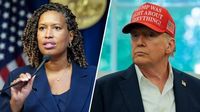In the waning days of a tumultuous federal takeover of Washington, D.C.’s police force, Mayor Muriel Bowser has set out a roadmap to regain local control and address the city’s ongoing public safety concerns. The 30-day emergency, declared by President Donald Trump in early August 2025, is scheduled to expire on September 10, but the political and practical aftershocks are likely to linger for months.
Bowser’s executive order, issued this week, is designed to facilitate a smooth exit from what she and many city leaders have described as an unwelcome federal intervention. Speaking at a press conference on September 3, Bowser was clear: “Let me tell you, without equivocation, that the mayor’s order does not extend the Trump emergency. In fact, it does the exact opposite. What it does is lay out a framework for how we will exit the emergency. The emergency ends on September 10. The only way it can be extended legally is by the Congress.” According to Fox News and CNN, Bowser’s intent is not to endorse continued federal involvement but to create a legal structure for ending it.
The mayor’s order establishes the Safe and Beautiful Emergency Operations Center (SBEOC), which will coordinate the city’s response and maintain communication with federal law enforcement as permitted by local law. Bowser emphasized, “We have a framework to request or use federal resources in our city. We don’t need a presidential emergency.” The SBEOC is expected to remain active during and after the federal emergency, ensuring that D.C. can access federal support when necessary but on its own terms.
The backdrop to this maneuvering is a dramatic drop in violent crime since August 11, which both the city and Trump administration have attributed to the combined efforts of local and federal officials. “Since August 11, 2025, due to the cooperative efforts between District and federal officials, violent crime in the District has noticeably decreased,” Bowser’s office reported. Attorney General Pam Bondi added further detail, noting that on the night before Bowser’s announcement, 92 arrests were made and 27 illegal firearms seized in the city. Among those arrested were two homicide suspects and five people accused of assaulting law enforcement officers.
Despite these apparent gains, the presence of National Guard troops and federal agents on D.C. streets has sparked controversy. Bowser has credited the federal law enforcement surge with helping to reduce crime but remains critical of the National Guard’s role and the operations of Immigration and Customs Enforcement (ICE) in the city. She explained that the Metropolitan Police Department (MPD) was legally required to cooperate with ICE during the emergency, but signaled her desire to return to a locally controlled approach as soon as possible.
That desire is complicated by ongoing political battles. Republican senators have praised President Trump’s intervention, with Texas Senator John Cornyn stating, “The nation’s capital has been plagued by out-of-control violent crime for a long time now. Fortunately, President Trump has not only acknowledged this problem, but he’s actually done something about it.” Utah Senator Mike Lee went further, suggesting that Congress should consider reforming or even undoing the Home Rule Act of 1973, which grants D.C. a measure of self-governance but allows the president to take control of the city’s police during emergencies. “If we can reform the Home Rule status, we can give that a try. But we have to remember, this is authority that is ours. It’s been delegated, delegated unwisely, in my view. If we can reform that, then let’s do it. And President Trump’s action is an important first step in that direction,” Lee said, according to CNN.
The Home Rule Act allows the president to federalize the MPD for 48 hours in the event of an emergency, but any extension beyond 30 days requires congressional approval. As the emergency’s expiration approaches, some Republican lawmakers are pushing for new legislation, including a proposal from Representative Andy Biggs of Arizona to extend the federal emergency for an additional six months.
On the other side of the aisle, House Democrats and local D.C. officials have been sharply critical of Trump’s actions. Representative Delia Ramirez of Illinois described the deployment of thousands of federal agents and military personnel as “the action of a wannabe dictator.” Representative Jesús “Chuy” García argued, “This escalation is not about public safety or about law and order. It’s an authoritarian power grab that has profound consequences, that seeks to target and profile, working class, immigrant and brown communities.”
D.C. Delegate Eleanor Holmes Norton has introduced legislation aimed at increasing local control, including measures to require federal agents in D.C. to wear body cameras and to give the District authority over its own National Guard. At a press conference, Norton stated, “No emergency exists in D.C. that the president did not create himself.”
Bowser herself has faced criticism from progressive groups and some residents who argue that she has not pushed back forcefully enough against the Trump administration. More than 100 progressive organizations, including churches and unions, wrote to the mayor urging a more confrontational stance. Bowser, however, has consistently emphasized the city’s unique legal status and lack of statehood, which limit her options. “We gotta get out of the emergency,” she said, underscoring her focus on restoring D.C.’s autonomy.
As the end of the federal emergency nears, Bowser is also looking to the future of the city’s police force. She announced a new labor agreement with the D.C. Fraternal Order of Police, which includes a 13% pay increase for officers, sergeants, lieutenants and above, effective October 1. The mayor has set a goal of increasing the MPD to 4,000 officers from the current 3,188, noting, “We need to add hundreds more police. We’re currently at 3,188 sworn officers.” This year alone, the city has hired 135 new recruits and welcomed 124 cadets into the pipeline.
Bowser’s approach has been to strike a pragmatic balance—cooperating with federal authorities where necessary, but always with an eye toward restoring local control and building a stronger, more independent police force. “These pay increases are part of a larger comprehensive strategy to recruit and retain and reward our officers,” she said. The city is also expanding programs that allow officers to take home patrol cars and partnering with local institutions like the University of the District of Columbia to bolster recruitment.
President Trump, for his part, has praised Bowser’s cooperation and held up D.C. as a model for possible federal interventions in other Democratic-led cities such as Chicago and Baltimore. He has also threatened to deploy federal authorities to those cities if, in his view, local leaders fail to address crime effectively.
As the September 10 deadline approaches, one thing is clear: the debate over who controls public safety in the nation’s capital is far from over. The outcome will not only shape the future of policing in Washington, D.C., but could also set a precedent for federal-local relations in cities across the United States.
For now, Washington’s leaders are racing against the clock—seeking to restore autonomy, rebuild trust, and ensure that the city’s safety remains in local hands.


